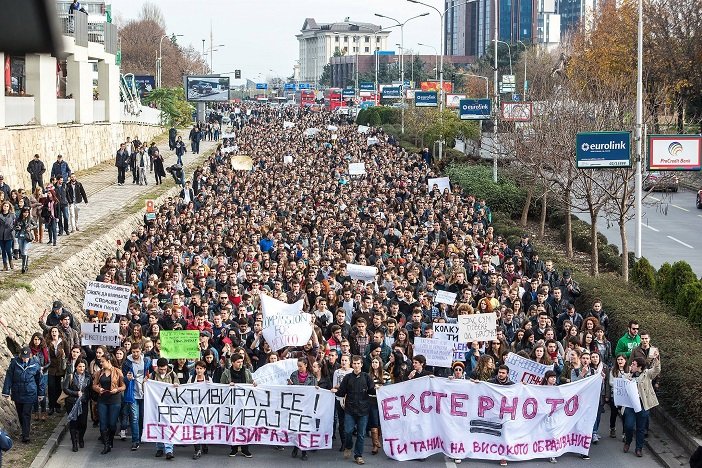Aiming to involve all the relevant actors in initiating a policy process for addressing the recommendations from the analysis, WFD’s office in North Macedonia gathered state representatives, international organisations and local youth structures on a conference on 18th of December 2019 to discuss the findings.
Opening the conference, the British Ambassador H.E. Rachel Galloway stated:
“Figures show that only 3% of young people are satisfied with their place in society. This picture has to change, because it is crucial to have strong, healthy and engaged youth. That is why we support this WFD project and their work on increasing the level of youth political and institutional participation. This is one of the key elements of how to increase youth involvement and engagement in the society.”
Damir Neziri, WFD’s country representative in North Macedonia reflecting on the findings of the study said that:
“Our findings, as well as those from similar studies, show that the problem is exceptionally complex, and that it can only be treated through a joint, comprehensive approach by the authorities, educational institutions and the civil society. Therefore, the recommendations of the study are also directed to all these actors. “

Talking about the relevance of the study, the North Macedonian Minister for Education and Science, Mr. Arber Ademi, said:
“I support the initiative to conduct the study, the results of which are an important indicator for the institutions on the satisfaction or dissatisfaction of young people with their inclusion and participation in the society. This research open possibilities for new ideas and collaboration. Some of the recommendations from the study that were already presented to us are included in the new laws on education which enable students to organise and participate in decision making on the programs of their schools.”
Some of the key findings of the study are:
- Less than a third of young people (31%) think that North Macedonia is moving in the right direction;
- Only 3% of young people are fully satisfied with their place in society;
- Young people generally believe they can not impact the way authorities work, with 6 out of 10 young people who believe they cannot have any impact at all;
- Roughly one in five young people (22%) in the country believe that the current government is committed to addressing the problems of youth;
- 71% of young people describe themselves as socially inactive citizens;
- Only 8% of young people have taken steps to solve a particular societal problem;
- 90% of the young people in North Macedonia have never been part of a civic/non-governmental organisation or initiative that works on social issues;
- 64% of young people state they always vote on elections. However, every second young citizen does not believe one can influence the situation in the country by voting in elections;
- 85% of young people think that the country needs a leader with a firm hand.
The study is important in generating understanding and insight in the perceptions of youth, not only because they constitute a quarter of the population of North Macedonia, but also because the future development of the country relies on the knowledge and values of these new generations. Young people in North Macedonia have undoubtedly left their mark on society. Whether through activism, engagement with youth organisations and volunteer work, though protest movements, or even through their emigration from the country, they strongly influence the social development of North Macedonia in different ways. With this research effort, we contribute to contemporary insight into the ways young North Macedonians think right now – about their place in society, their engagement, and their outlooks.
